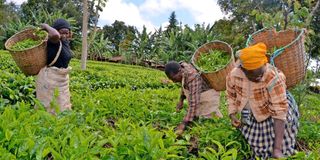Securing land ownership will hasten development

Farmers pick tea on a farm in Kiangondu village in Tharaka-Nithi County. Land security is one of the many of the Sustainable Development Goals (SDGs) 2030 targets signed in 2015.
Most people in the developed world don’t have to worry about losing the right to live where they do.
If you have a deed or rental contract, it is unlikely that somebody will show up tomorrow with their own paperwork and kick you out. This security means owners who build a new kitchen know they can enjoy it for decades or boost the value of the property.
Imagine if you weren’t sure you really owned your house. Maybe you could keep living here next year. Maybe somebody would boot you out.
Not only would you be psychologically worse off but also be much less likely to invest in making your home or land better. Yet, for most people in developing countries, secure property rights are a rare luxury.
Globally, 70 per cent of the population has no access to formal land registration systems. One in five, or almost a billion people, consider it likely or very likely they will be evicted in the next five years. In Kenya, 26 per cent consider themselves insecure.
Land security
Land security is one of the many of the Sustainable Development Goals (SDGs) 2030 targets signed in 2015. In a research paper published recently by my think tank, the former lead land specialist at the World Bank, Dr Frank Byamugisha, and his colleagues show the amazing benefits of better land registration systems. That would be among the most effective ways to speed up delivery of SDGs.
The study focused on Sub-Saharan Africa (SSA) as it has the lowest proportion of land that has been mapped and categorised by governments: At just 14 per cent, the region has the weakest land property rights and highest levels of disputes. Africa also has, by far, the most adults insecure in property tenure, along with the highest cost of registering land.
Path-breaking countries like Rwanda have shown it is possible to register land, digitise the information and provide legal mediation to resolve inevitable disputes. Nonetheless, achieving greater rural land security in Africa will take enormous effort with 86 per cent of its rural plots unregistered. The cost will run to about $21.7 billion (Sh2.9 trillion).
Spending that to deliver almost $400 billion in benefits is a very good investment, achieving $18 of social benefits for every dollar spent.
The case for increasing land tenure security is even stronger for the almost half a billion people in SSA’s urban areas.
More than a third of the parcels are unregistered, and it would cost less—$5.2 billion—to survey and register them, including in slums, along with dispute resolution and running the system. The benefits are $160 billion, or 30 times the cost.
The world is failing to deliver on many of the most important promises of the SDGs, in part because this agenda set out to do everything at once. We need to prioritise the smart solutions first.
Dr Lomborg is the president of the Copenhagen Consensus and Visiting Fellow at Stanford University’s Hoover Institution. [email protected] @BjornLomborg www.lomborg.com.





